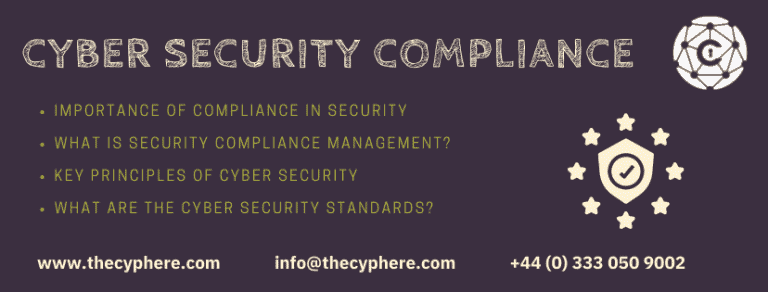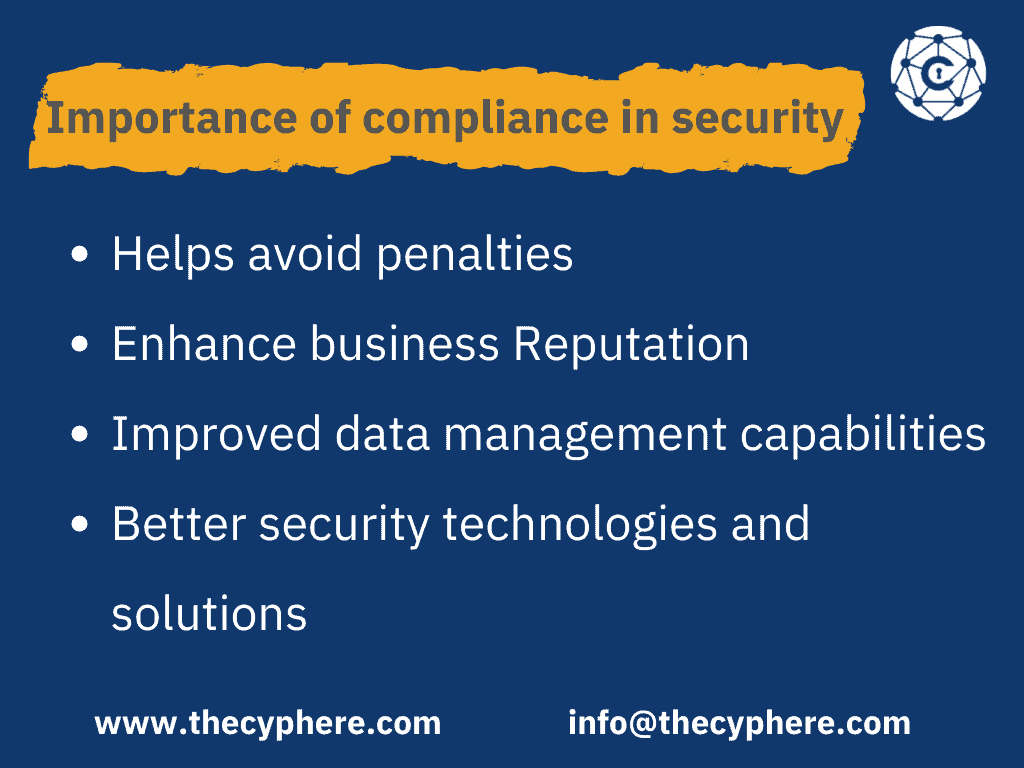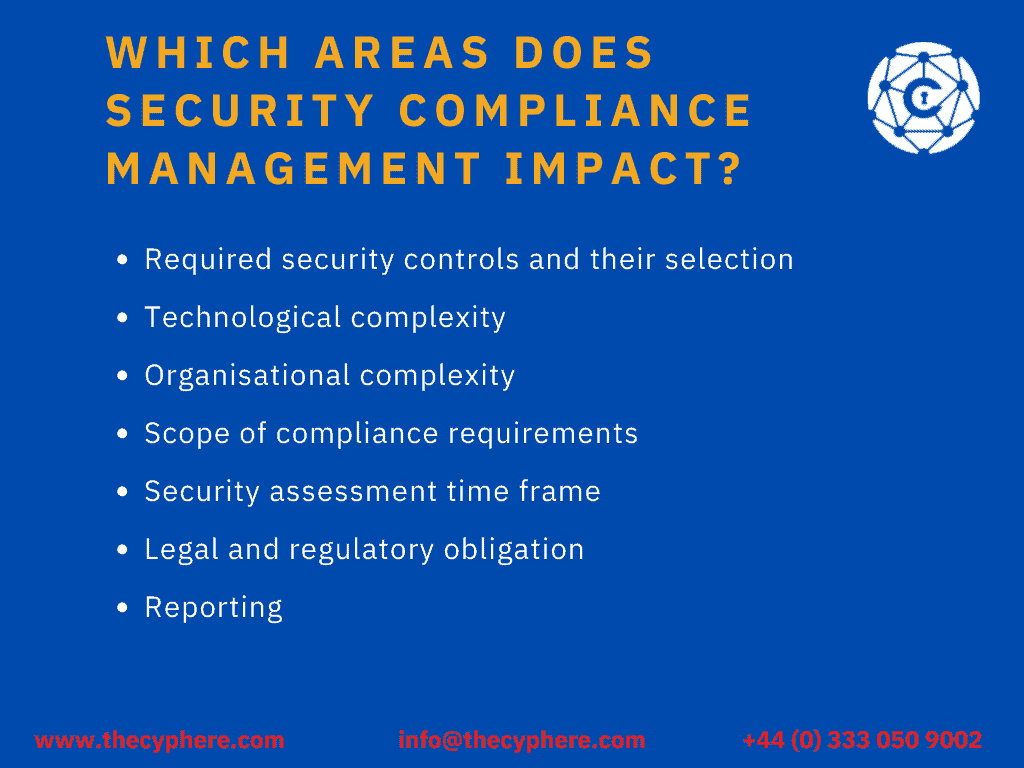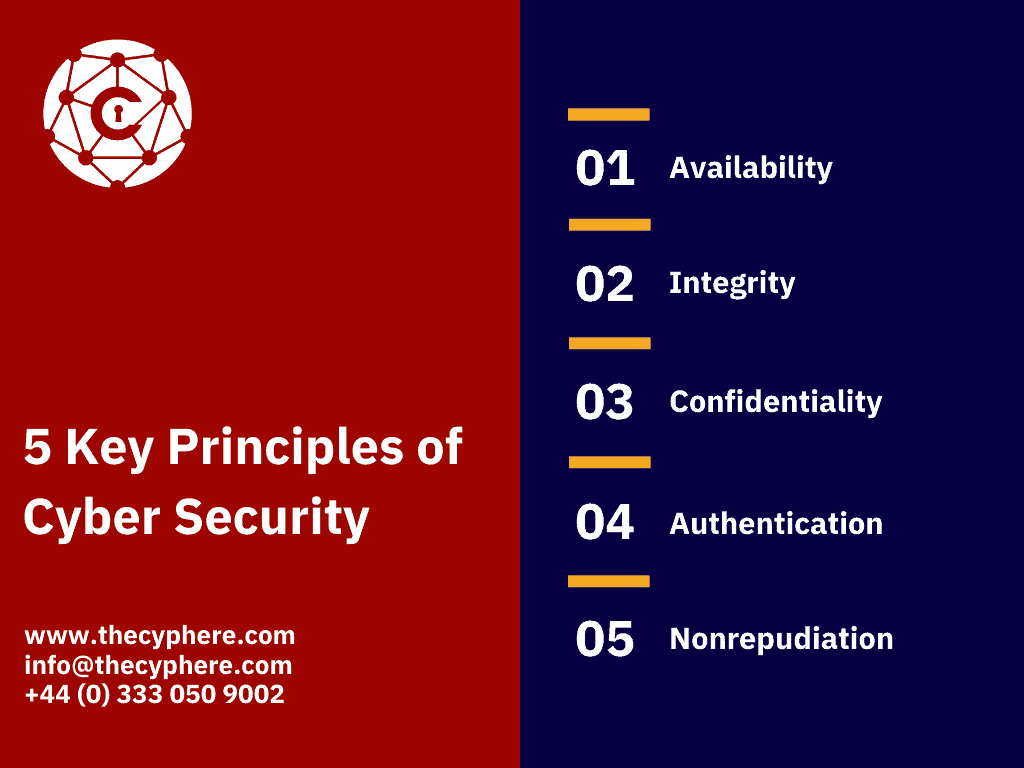
Usually, IT professionals and newcomers to the information security domain confuse security and compliance, which is not their fault. Both are to protect individuals’ and businesses’ digital and physical assets through appropriate security measures.
On the whole, information security emphasises performing due diligence to maintain the CIA triad, whereas compliance does the same but with a different motive. Compliance complements the security controls, often being the driver behind conducting pen testing assessments or other security compliance validation exercises such as PCI testing which is why the lines between compliance and security get blurred.
This blog revolves around cyber security and compliance to discuss fundamental security vs compliance features and essential security compliances and standards businesses must obey to maintain cyber health, reputation, and finances.
What are security and compliance?
Security: Cyber security is an ongoing practice of executing technical tools, processes, and controls to protect sensitive data and critical assets of information systems to guard against risks and attacks. Security’s primary goal is to ensure confidentiality, integrity, and availability of the system and assets. It can be achieved through physical and technical controls.
Furthermore, where the compliances accommodate meeting legal, and financial risks, cyber security facilitates protecting people, devices, and networks to assure the confidentiality, integrity, and availability of assets.
Compliance: Compliance means rule adherence to third-party regulatory requirements, frameworks, and policies enacted by industry groups and authorities to align the business’s operations with law. Security compliance testing services example would include PCI DSS and segmentation tests, ISO 27001 based vulnerability scanning, DORA ICT risk assessments, gambling commission yearly audit or other compliance requirements.
The primary goal of compliance in security is to ensure that the company’s data is processed and collected by meeting the pre-defined standards or framework with minimum security-related conditions. Unlike security, compliance is a critical element and necessary for a business to operate. It can be multifaceted. However, it covers legal, financial, and other types of risk based on company data types and processes.
Why is compliance in security important?
Since the businesses started operating and growing online, data breaches have significantly increased and become a norm for small and mid-size businesses for the world’s largest enterprises. All such data breaches and cyber-attacks made security a primary concern worldwide and developed a need for a centralised structure to support customer/user data privacy and security.
Furthermore, almost every business relies upon users’ personal information and sensitive data. Therefore, businesses become accountable for their unharmed administration and protection whenever they opt to collect and process customer or user data.
Compliance in security mandate businesses to create systems and processes to protect user data and initiate necessary precautions to maintain its safety. Its adherence is substantial because it drives businesses to perform due diligence in protecting collected and stored assets.
Cyber security compliances might seem a burden to any organisation, but it dramatically helps in multiple areas.
The compliances involve various organisational processes and technologies to safeguard data. Still, they vary in terms of data type that businesses handle, geographic, i.e., in which region the business operates, general regulation, and specific-business sector regulatory conditions.

Whatever the case is, cyber security compliance standards are essential to have due to many reasons. Some of those are:
Helps avoid penalties
One of the main reasons you must comply with regulations and standards is that it helps avoid penalties and a massive fine if data breaches or cyber-attacks occur to the company. The penalties go from $100 per violation to 20 million euros monthly, depending upon the governing bodies.
To comply with the standards or laws, you must be aware of existing compliance laws that apply to your business. Such as, if your business is associated with the healthcare sector, you must verify the necessity of adherence to HIPAA.
Similarly, if your company processes or stores any financial transaction, you must comply with PCI DSS. In contrast, if your business doesn’t belong to specific sectors but processes and collects EU or UK citizens’ sensitive information, then you must observe GDPR.
Enhance business Reputation
In addition to penalties, data breaches and attacks significantly impact the business reputation by sending out the message that the company does not undertake the customers’ privacy, not care about data protection.
Compliances meeting the framework add trust to the company’s name. Reputation means everything to any business; if your customers do not trust you or you have a bad reputation in the market, your business cannot survive for long. All of such bad reputations eventually lead the businesses to lose customers and brand reputation. Read more about our experiences in legal sector discussing cyber security, retail, education, financial services.
Improved data management capabilities
All compliance obligations provide guidelines to protect data and help implement the security controls to preserve the assets. In addition, you can redesign your data protection strategy through the compliance rules and streamline your systems to make the data monitoring, modification later, and storage more sound and secure.
For example, GDPR has provided data subject access requests to users, through which they can request the company to provide the data processing and collection records anytime, anywhere.
So, if the company had undertaken compliance in its data security mechanism, it would be easy for them to fulfil the user request as they would know where and how the data was collected and stored in the first place.
Better security technologies and solutions
The standards direct companies to have appropriate security mechanisms, updated software, and systems, along with authorised and authenticated access to secure the data.
Regulations such as GDPR, and PCI DSS bounds businesses to enforce robust access control systems so only legitimate users can access sensitive data.
Is compliances part of security?
Security is independent and does not rely on any compliances. But, compliances integrate some of the security requirements in its guidelines that are mandatory for organisations to incorporate in their business strategy.
For example, almost all of the standards have mentioned security requirements such as data privacy and protection countermeasures, continuous security assessments, updated software and applications, risk management and analysis mechanism, etc. In comparison, none of the security control demands compliance specifications.
What is security compliance management?
Security compliance management is a minimum requirement to maintain data security across the organisation’s processes. It is an ongoing exercise and foundation to ensure that organisations have all defined components to practice information security and legal demands in the operational business environment.
In essence, this process is all about planning, organising, controlling, maintaining, and accessing activities and assets to make businesses obey industry standards, policies, and regulatory demands.
The organisation must have a compliance management program to understand how the business should perform its day-to-day operations. It helps streamline the business flow concerning the regulatory standards effectively and continuously monitor the documented and implemented security measures adequacy and status.
The compliance aligned the organisation’s business and security goals by assessing the assets to identify elements not operating according to documented policies and processes that do not comply with the framework due to misconfiguration, missing security measures, or other resources.
With appropriate security and compliance management program, an organisation can specify and determine the risk and threats they face according to their business models, technologies, processes, and people.

Security compliance management impacts multiple areas of the business environment; some of them are
- Required security controls and their selection
- Technological complexity
- Organisational complexity
- Scope of compliance requirements
- Security assessment time frame
- Legal and regulatory obligation
- Reporting
What are the five key principles of cyber security?

The five fundamental principles of cyber security defined how businesses should undertake sensitive data collection, processing, transmission to protect their critical assets. The five principles are:
- Availability
- Integrity
- Confidentiality
- Authentication
- Nonrepudiation
Availability
The availability principle guarantees that the system or service must be available to the user whenever they need it. Attackers use the most common attack vector, such as Denial of services (DoS), to interrupt the network and make it inaccessible to regular users. Along with other security elements, compliances bound companies to provide uninterrupted and 24/7 availability of system, data, application.
Integrity
Integrity refers to data accuracy, which means no unauthorised or unauthenticated person can modify or misused the data. Cyber security compliances force organisations to implement security controls and mechanisms such as encryption, access control system, error detection software, etc., to prevent data tampering and alteration.
Confidentiality
Confidentiality assures that data is only available and accessible to the authorised user in all conditions, i.e., data in use, at rest, or in motion. In this context, compliance bounds the organisations to design adequate solutions that dictate adequate control mechanisms and benchmark how the authorised user can access the data.
Authentication
This principle refers to the process of verifying the authenticated user. Similar to the other principle, security compliances directs that organisations have controls to identify the user authenticity before they access any confidential information.
The authentication controls are common and easy to integrate through passwords, multifactor authentication, biometric tools, scannable cards, etc.
Nonrepudiation
The non-repudiation principle refers to a proof of action that transmitted information is not altered on both ends (i.e. receiver and sender). It can be achieved through file log tracking, signature, verified cross-network data exchange system.
What are the cyber security standards?
The cyber security compliances scrutinise business processes, data types, including the industry sector, and associate them to a distinct set of regulative requirements, which comes in the form of enacting rules, standards, or best practices.
These standards are a generic set of rules, technical specifications, and practices created by security experts. Regardless of their sizes, organisations need to follow to gain authorisation of certain entities such as data collection, credit card processing, etc.
The detailed list of policies and best practices shield sensitive data and critical assets in order to achieve the basic cyber security principles such as confidentiality, integrity, availability, etc.
Adhering to compliance standards plays a huge role in gaining customer trust and creating business reputation globally. In addition, it also provides guidelines for maintaining security posture and culture within the organisation.
The cyber security industry offers various types of standards and frameworks for businesses that organisations can easily follow and incorporate into their business strategy efficiently.
General Data Protection Regulation (GDPR)
The GDPR is a data protection and privacy law enacted by the European Union on May 25, 2018, to mandate businesses operating in the EU region or dealing with EU customers to conform to the GDPR principles and provide citizens broader control over their personal data collection and processing.
In addition, the law provides guidelines and covers all aspects of data protection technical controls that help reduce the risk, attack surface, and likelihood of cyber attack.
The GDPR helps businesses embrace a secure workflow and penalises organisations and businesses that fail to adopt legislation or expose EU citizen personal information and sensitive data in data breaches and privacy outbreaks.
PCI DSS (Payment Card Industry Data Security Standards)
PCI DSS is a security standard launched on September 7, 2006, by PCI SSC, an independent regulatory body formed by major credit card companies- Visa, MasterCard, American Express, Discover, and JCB to manage and maintain the payment card industry with a unified set of standard with an aim to improve the payment account security throughout the transaction processes.
It is designed and mandatory for all organisations that accept, process, handle, store credit card information despite the size and number of transactions. It includes fintech, banking sectors, businesses accepting card payments, and storing sensitive information such as name, credit card number, etc.
PCI DSS compliance defined 12 requirements under six focused principles with actionable steps that businesses must implement to comply with the PCI controls. PCI does not impose penalties; instead, it charges $5000 to $100,000 per month until the merchant and businesses achieve PCI compliance.
ISO 27001
ISO 27001 is an international standard published by the International Standard Organisation to facilitate industries and organisations of all sizes to protect their information system with a combination of policies and processes most systematically and cost-effectively.
It defines rules and requirements through the adaptation of ISMS (Information Security Management System) and enables organisations to handle the security of assets such as PII, financial information, and intellectual property.
National Institute of Standards and Technology (NIST)
NIST framework is designed voluntary for businesses and organisations to access, control and mitigate cyber security risk. It provides supervision to reduce the internal and external attack surface with specific sets of instruction and customisable activities based on standards, best practices, and guidelines.
In a nutshell, it extensively helps businesses in eliminating cyber dangers with effective risk management processes.
Minimum Cyber Security Standard
Minimum cyber security standards MCSS is a set of five cyber security functions published in 2018 by the National Cyber Security Center (NCSC) as a closet approximation of the international cyber security NIST framework.
It has been made mandatory cyber security strategies be used by government departments and agencies in the United Kingdom to help the organisation identify, analyse, and mitigate cyber threats and risks.
Health Insurance Portability and Accountability Act (HIPPA)
HIPPA applies to healthcare service provider and businesses in the healthcare industry that handles personal health information (PHI). HIPPA framework legislates how the organisations must manage, use and maintain patient personal sensitive and health-related data security.
It focuses on implementing administrative, technical, physical security measures to ensure PHI is confidential and protected against cyber threats and attacks.
Along with supervising methodologies to protect against data breaches, Health Insurance Portability and Accountability Act imposes fines of $1.5 million annually or $100 to $50000 on each violation.
Can you have security without compliance?
Yes, you can have security without compliances. You do not need any specific compliance to secure your organisation. As we have mentioned earlier, compliances are only necessary to meet the country’s regulations and business industry requirements. In a broader scope, security implies compliances, but compliance does not imply security the same way.
Most businesses already have security in the form of low to mid-level protection on IT infrastructure such as installed anti-virus, surveillance, passwords, etc. But, when it comes to robust security mechanisms, this is where businesses lack. If your business has robust security, it will likely be easy for you to undertake compliance requirements.
Security reduces breach impacts, and compliance prevents penalties, but security and compliance go hand in hand for more robust data privacy and protection.
Get in touch with us to discuss your compliance and security concerns; we offer multiple compliance solutions and help businesses implement security controls according to their requirements and industry sector.
Shahrukh, is a passionate cyber security analyst and researcher who loves to write technical blogs on different cyber security topics. He holds a Masters degree in Information Security, an OSCP and has a strong technical skillset in offensive security.












